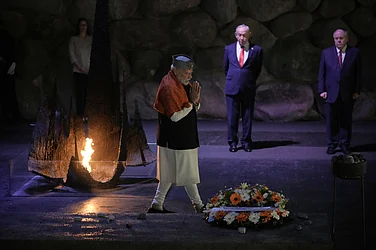Chinese President Xi Jinping has set off alarm bells in the region with his statement on Sunday that China will never promise to renounce violence to take control of Taiwan.
The comments could be seen and dismissed as a reiteration of China’s stated position on Taiwan.
But in an atmosphere of uncertainty following Russia’s invasion of Ukraine and the rising tension in the Indo-Pacific in the wake of China’s aggressive rise, Xi’s pledge has set off alarm bells.
There are worries in the strategic community that China is now entering a new phase where it is breaking away from the era of collective leadership to that of a ‘one-man’ rule under Xi Jinping.
He is the most powerful leader in China as the general secretary of the Chinese Communist Party. He also holds the post of the Chairman of the Central Military Commission that makes him the head of the People’s Liberation Army and he is also the President of the country.
He is likely to become more powerful by getting an unprecedented third-term as the general secretary of the party.
Many observers see him as the most powerful leader in China after the founder of the People’s Republic of China, Mao Zedong.
Most of the key positions and important posts in the Chinese Communist Party are now being filled by Xi Jinping loyalists, who will not be in a position to criticise or prevent a policy that is announced by the general secretary.
Therefore, the comments on Taiwan are being taken with more seriousness.
Xi told delegates at the Chinese Communist Party’s 20th National Congress in Beijing on Sunday that “Complete reunification of our country must be realized, and without doubts it can be realized.”
He pointed out that China will continue to strive for peaceful reunification with Taiwan with utmost effort, while adding, “But we will never promise to renounce the use of force, and we reserve the option of taking all measures necessary.”
However, China’s threat to use force as an option for Taiwan’s reunification will not deter the United States from engaging and sending high-level delegations to the self-governed island.
China is uncomfortable with foreign leaders coming to Taiwan and had thrown a fit when the US House Speaker Nancy Pelosi visited there in August. Beijing sees these visits as an attempt to treat Taiwan as a sovereign state.
China’s coercive military drills with fighter aircrafts, warships, and missiles had created an unprecedented crisis across the Taiwan Strait for days.
But its muscle-flexing had proved counter-productive. US officials continued to visit Taiwan and leaders of several countries expressed their desire to travel to the island as an expression of solidarity with the Taiwanese people in the face of China’s rising coercion.
Though the People’s Republic of China claims Taiwan to be its territory, the island has never been ruled by the PRC.
"Resolving the Taiwan question is a matter for the Chinese, a matter that must be resolved by the Chinese," Xi said, asking outsiders not to interfere in the affairs of the island.
The US had switched diplomatic allegiance to the PRC from Taiwan in 1979, acknowledging the “one China” policy that makes the island a region of the People’s Republic of China.
But during the negotiations with Beijing, the US had also made it clear that it will continue to maintain trade and cultural relations with Taiwan and supply it with weapons for self-defence.
It was also part of the understanding that the reunification between China and Taiwan will be done peacefully and not through force.
However, the question, whether the US will militarily intervene if Taiwan came under attack from China, was deliberately left vague—a policy known as strategic ambiguity.
This had served two purposes: one, it discouraged leaders in Taiwan from seeking independence from the mainland, two, it deterred China from using military force to make Taiwan join the mainland.
But in recent years, especially since the Donald Trump presidency, Washington has taken more interest in the affairs of Taiwan.
President Joe Biden has followed Trump’s policy in taking a tough line on China. He has also broken the strategic ambiguity on several occasions by saying the US will come to Taiwan’s support if attacked by China.
These have been seen as encouragement for separatists in Taiwan who in turn have hardened their position on the reunification with the mainland.
But Taiwan has become part of the ongoing battle between the US and China for establishing global supremacy in the economic and high-technology sectors.
Taiwan is the leading chip maker in the world and dominates the global semiconductor market. The island’s autonomy is of vital geopolitical interest to the US which, like China, is dependent on Taiwan for high-tech chips.
China has been developing its own semi-conductor industry. However, it is still dependent on Taiwan for both high-end and basic chips.
China’s strong reaction to Pelosi’s visit came on the back of serious US efforts to cut-off China’s access to high-end Taiwanese chips.
Though the presence of Taiwanese chipmakers in China has always been a concern for Washington, since the advent of 5G technology, the high-tech war between the US and China has intensified much more.
The US too, is heavily dependent on Taiwan, especially its leading company — the Taiwan Semiconductor Manufacturing Co. (TSMC) — for cutting-edge chips.
In recent months, the US has been trying to convince Taiwan’s leading chip producers, like TSMC, to shift production to the US and Japan in order to reduce their vulnerability to Chinese attacks.
TSMC alone controls over 53 percent of the market, and along with other Taiwanese chip producers, supplies more than 63 percent of the world’s chips.
The company’s decision to move some of its production to the US and Japan was seen by Beijing as America’s attempt to cut off China’s access to semiconductors, and scuttle its emergence as a modern economy.
The last major crisis in the Taiwan Strait involving the American and Chinese navies was in 1995- 1996. China was miffed over a visit by the Taiwan president to the US. When in protest it fired missiles near Taiwan waters, the US decided to flex its military muscle by sending warships and sending aircraft carriers to pass through the Taiwan Straits. China got the message and backed off. As a face-saver the US assured that there was no change in its “one-China” policy.
But China’s military capability has significantly improved in the past decades and when a powerful leader backed by nationalist supporters consolidates his power in Beijing, the next crisis in the Taiwan Strait could prove to be more lasting and difficult to resolve.






















